5 de septiembre 2022

European Concern over Lack of Academic Freedom in Nicaragua

PUBLICIDAD 1M
PUBLICIDAD 4D
PUBLICIDAD 5D
Education is “the ticket to getting out of poverty” says the Nicaraguan woman from a working class upbringing
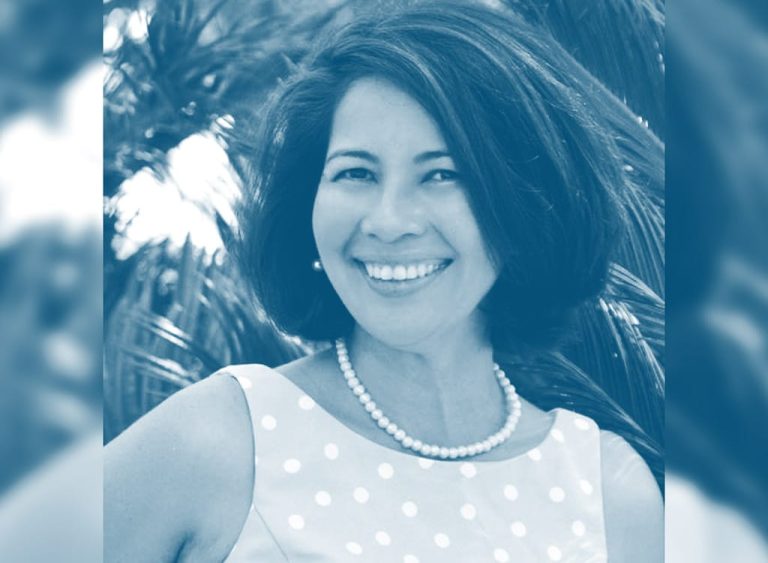
Irella Pérez. // Foto: Cortesía
“Believe In The Power Of Education!” Every email that Dr. Irella Perez sends has this mantra alongside her name and contact information. This mantra is something she has lived and preached over a 30-year career in the US educational system: “Believe in the power of education!”
This 51-year-old Nicaraguan American, resident of Whittier in Los Angeles County, has broken barriers in her professional field since her arrival to California in the middle of the 1980s.
With a doctorate in Educational Leadership from the University of Southern California, she moved from teaching preschool through elementary and secondary education to a role as principal in various educational centers and then to superintendent – the first Latina to hold such this post in her district. She also served as an elected member of a local school board, and has dedicated her life to volunteer work and social activism in her community.
As a child, Irella Pérez, born of Nicaraguan parents of Chinese descent, lived in the Central America neighborhood, a middle-class neighborhood in Managua. “My mom and dad weren’t rich, they were working class. We didn’t go to restaurants or things like that, because all the money went for school,” she recalls.
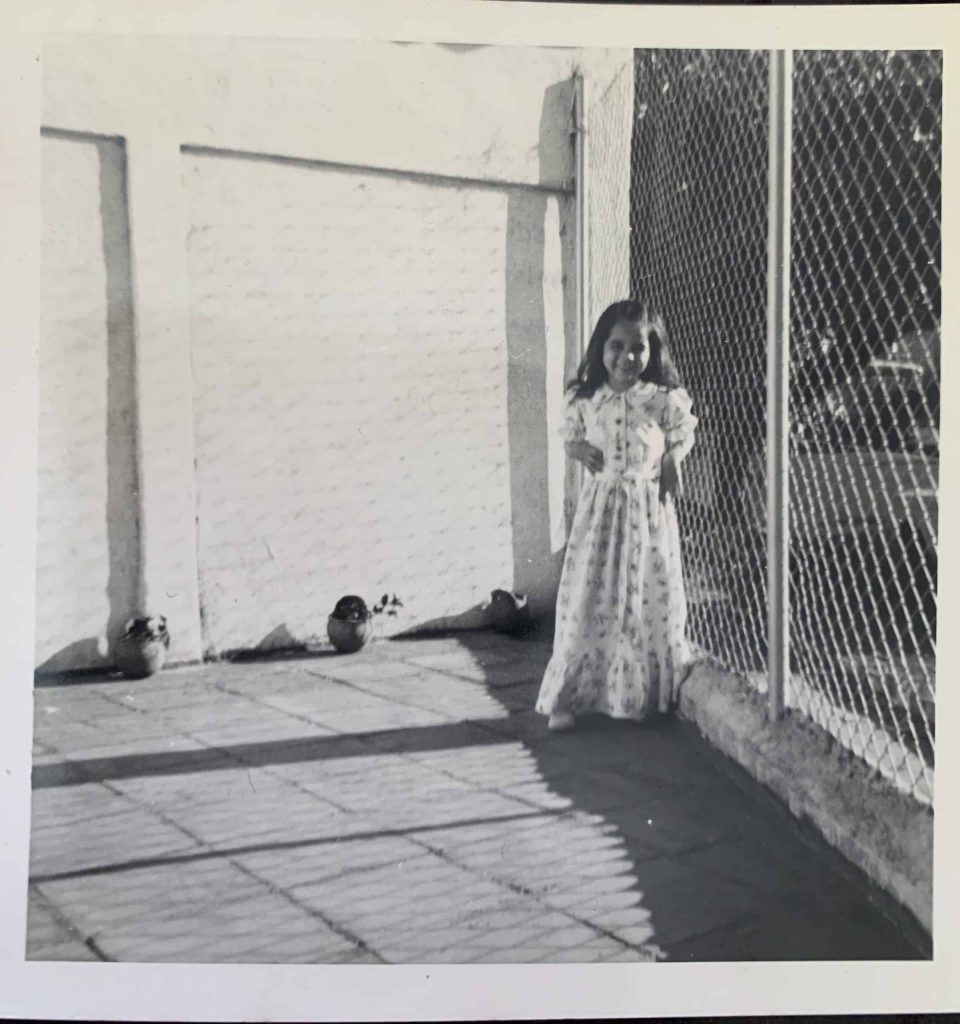
Irella as a little girl in Nicaragua. She lived in the Centroamerica neighborhood. Photo: Courtesy
With their jobs at a real estate agency and a bank, her parents provided for the four children, Irella being the youngest and, therefore, “the insolent one”, she admits with a smile. She attended the private Catholic schools Pureza de María and Centroamérica, but also studied for a time at the Salvador Mendieta public school. “That’s when I realized that not all education is the same, not all of us have access to the same thing. The children and teachers were very nice, but the standards were lower, the education was not equal.” she reflects.
This marked her as much as being born under the Somoza dictatorship, overthrown eight years later, and having grown up in the midst of a civil war in the 1980s, which ended up causing the entire family to emigrate. “My formative years were during the Revolution. We wanted to believe that there was hope of improving the country and we realized that the same dictatorship continued, (but) with different people. That has shaped my character, I know how to identify systems of corruption and injustice, I know what causes the lack of priority of social and educational issues”, she says.
Her brothers had already left the country to escape the military draft. “They were at risk of losing their lives, because the boys at that age were not being given any training and they were all coming back mutilated or simply disappeared,” she recalls. According to accounts of the Nicaraguan civil war between the Contra forces, financed by the United States, and the Sandinista Army, more than 40,000 Nicaraguans died in the conflict, which also sparked one of the largest migratory flows up to that time, with tens of thousands of people leaving the country, including Irella’s family.
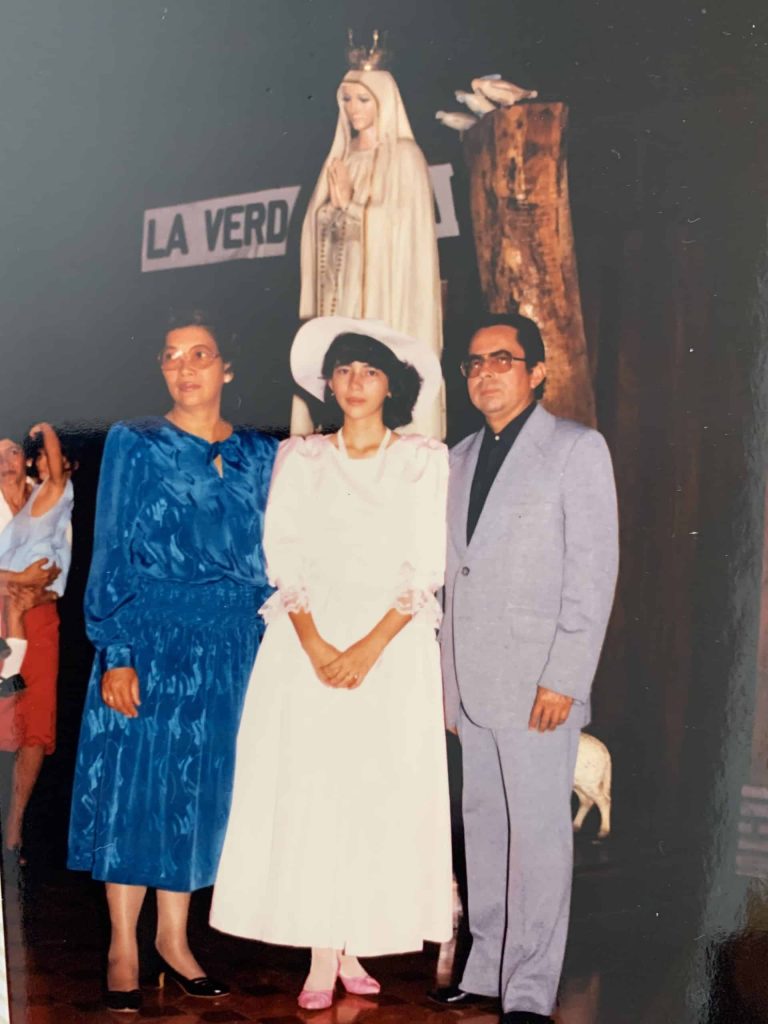
Celebrating here 15th birthday with her parents days before leaving Nicaragua: Photo: Courtesy
Irella turned 15, a very symbolic age in Latin American culture, when it is believed that girls transition to adulthood. Only days later she had to leave for good for the United States.
That is how she came to live in Los Angeles in a working class neighborhood. Irella Perez describes that time as “a shock” that she didn’t fully process until many years later.
Going to school suddenly became a more difficult mission. Because the city was then receiving a considerable influx of Central American migrants, schools in the area were very overcrowded, and Irella had to travel three hours by bus to and from her new school every day.
The school was located in a mostly white, high-income neighborhood with very few non-white students. Irella recalls that many in those neighborhoods “didn’t want brown kids,” and some classmates treated her differently. “Cholitas or cholitos,” she recalls, were the labels assigned to low-income Latino children.
In addition to all this, Irella did not speak any English. “I thought everyone loved me a lot, everyone was friendly, they were laughing all the time. It wasn’t until I learned English that I realized that they were laughing at me for being different, for not knowing the language, for not having nice clothes,” she remembers.
At home there was little money, but a great deal of ambition for a better future. Irella’s father was employed at the Beverly Hilton hotel as a dishwasher, while her mother worked in a Chinese clothing factory in downtown L.A. Irella also helped out. Her first job was at El Pollo Loco, a Mexican franchise restaurant.
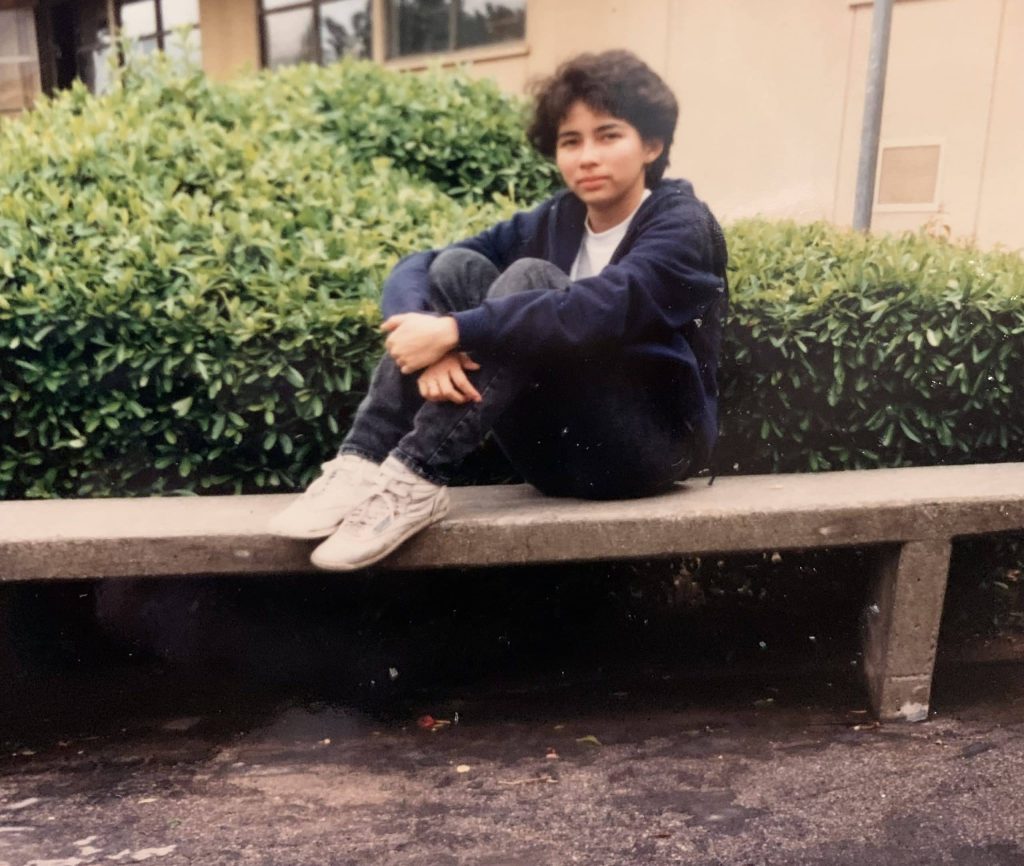
At Chatsworth High School in the United States. Photo: Courtesy
At home everyone had to pitch in to pay the bills, but there wasn’t enough to pay for higher education. Her mother, however, was adamant that Irella would go to college and get a degree. Irella remembers working three jobs during college and applying for financial aid to accomplish her mom’s wish for her.
There were other, negative, voices but she chose not to listen to them. “I had a counselor who told me not to look at myself as a college student, not to waste my time.” Those words only served to give her greater conviction, and taught her “to have the courage to say ‘thank you, but I’m going to move on.'”
“I got to college with a lot of desire, being stubborn, understanding that my ticket out of poverty was education,” she shares.
Perez went to a junior college for two years and then transferred to California State University at Long Beach where she earned a degree in Spanish Literature. She also earned the credentials to become an elementary and secondary teacher, and thus began her career with the US education system.
“I applied for a job when I graduated and, wow, I was already a teacher in the United States. I loved being a teacher. Teaching a child to read is the most powerful thing in the world,” she says.
She also earned her Master’s in Educational Administration and then went on to pursue a doctorate in Educational Leadership at the University of Southern California (USC), one of the best in the country. “I didn’t believe it myself,” she exclaims, recalling how hard it was along with the satisfaction of earning her PhD after taking care of her one-year-old daughter while pregnant with her second child.

Irella Prez at her PhD graduation ceremony in Educational Leadership at USC. Photo: courtesy
Dr. Irella Pérez found her purpose in the education system. “I believe in the power of education, of justice, the power of one person and the collective power. I realized it was a vehicle to prepare myself, to improve and share ideas that I saw were scarce, regarding access for women, and access for low-income children,” she reflects.
Perez was a preschool teacher, a teacher of other grades, a university professor and a school principal at a time when there were few Latino teachers and even fewer principals.
Having experienced firsthand the difficulties brought on by a lack of resources, being bilingual and knowing the realities of Latino populations helped her connect with the entire school community, including parents, students and teachers.
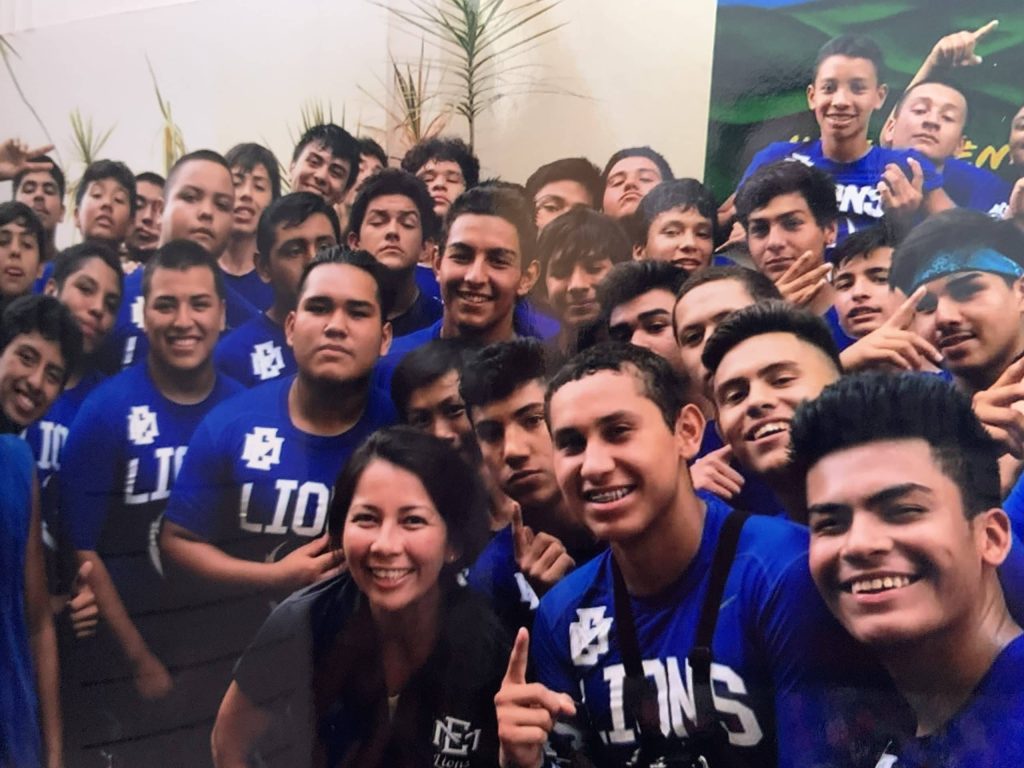
Irella Perez with her high school students. Photo: Courtesy
“I’ve always had to work in the poorest schools, where they put Latinos, and it’s more difficult because there are many more social problems. I now see my experience as a blessing, but as the less experienced (teachers and principals) we were thrown into the neediest places – it’s all part of a racist system,” she reflects.
“If you’re a person who hasn’t lived the same kind of life as your students and teachers, you don’t know who they are, you’re not going to be able to understand them and give them what they need. The teacher has to understand that if the student doesn’t know the lesson it’s might be because they don’t have a bed to sleep in or because they’re an abused child,” she adds.
Irella continued to break barriers and in 2015 became a superintendent of the El Monte Union district, one of the superintendents with hundreds of schools in their district in California, one of the richest, largest and most diverse states in the country.
It was an accomplishment as a woman and a Latina, since at the national level only between 24% and 27% of superintendents are women, while Latinos make up only 13%. At the California state level, between 2017 and 2018, out of 920 superintendents, only 4% identified as Latinas. Irella assures that, in her case, she was the first Latina to hold that position in that particular district. “No Latina person, despite the fact that it was a majority Latino district, had ever held the position,” she says.
She received the news with great joy; she had broken yet another barrier. The district’s board had unanimously selected her from a large pool, despite having no prior experience in district administration, but plenty of experience with vulnerable populations.
“(Perez) had heart, she had passion, she had the conviction to help our students. Coming from a school district that has gone through many trials and tribulations, it was proof that she is a person determined to succeed, regardless of lack of resources,” district board members responded to criticism in the local media.
Taking the post in March of 2015, she managed an annual budget of $120 million, serving more than 20,000 students. “It’s a highly political position, you have to be very tactful, navigate all kinds of issues, and form functional teams focused on the community and the children,” she explains.
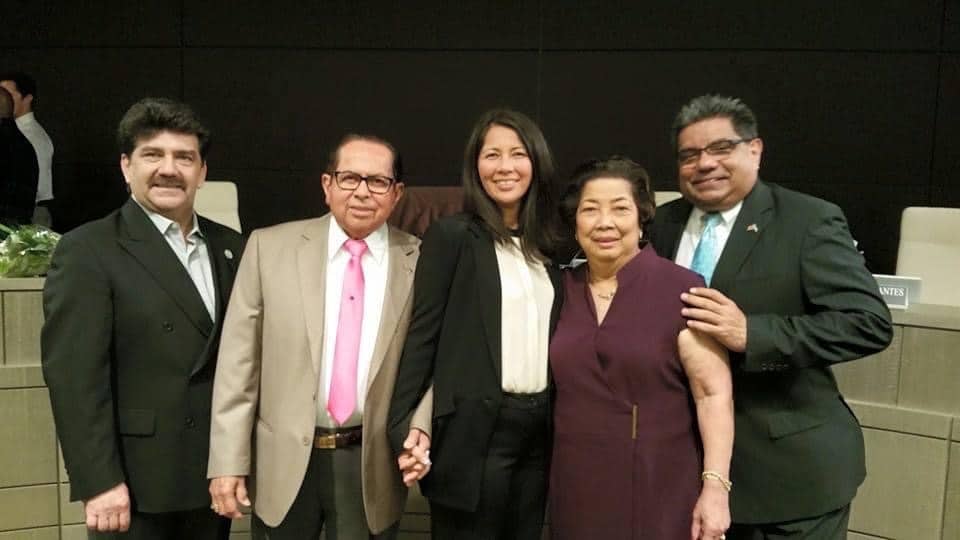
Irella Perez with her family and close colleagues celebrating her being chosen as a superintendent in 2015. Photo: Courtesy
In November of that same year, there were changes in the district board, and with that, the outlook for Irella also changed. Despite receiving a positive job evaluation in October 2015, by March 2016 she was temporarily suspended from her position and eventually fired. Perez decided to sue the district, arguing that she had been the victim of wrongful termination based on retaliation and discrimination.
“It was malicious, it was harassment, they wanted me to do things that didn’t fit with my ethics, nothing against the law or criminal, but, for example, to employ people who had political positions in the city, or to employ contractors that they (the board) had relationships with,” she details.
Commenting on the legal process, Irella also shares that she was tried for her alleged “inability to use proper grammar in external and internal communications,” to which she responds that just three errors in fragments of her writings were presented as evidence. “They thought it was a good excuse…they thought ‘(she is) Latina, migrant, she has problems with the accent’.” The educator also lamented that they questioned her ability to take on her role because she is a single mother of young children.
It was one of the most painful moments in Irella’s life. She was unemployed, unable to find a job because she had been laid off and had to support her four children. When news of her case appeared in the local newspapers, she received letters from citizens, some with threats and insults, others with messages of support and solidarity.
In the end, Irella won the lawsuit and, according to newspaper reports, should have received more than $700,000 from the district. The jury unanimously found in her favor on the charge of wrongful termination based on retaliation, but Irella believes there was also discrimination. “I did feel it, I know who employed me and I know how it was when I came in and everything changed. It hurt my dignity, because I am a woman, a Latina, and I wake up every day a Nicaraguan and a migrant,” she confesses.
Perez says her case is not unique. She has a support group made up of other superintendents and educational administrators, and says that several of them have gone through the same thing. “Many are Latinas, not all of them. We support each other,” she adds.
With the peace of mind of having obtained justice in that episode of her life, Irella says that she became “stronger”, continued with her social work volunteering and excelling in other areas. She served for nine years on the school board of Whittier, the city where she currently resides, an elected position.
Irella also decided in 2018 to run for city council. She aspired to be the first Latina woman in her district and although she ultimately did not win, she comments with satisfaction that the next Latina to run did.
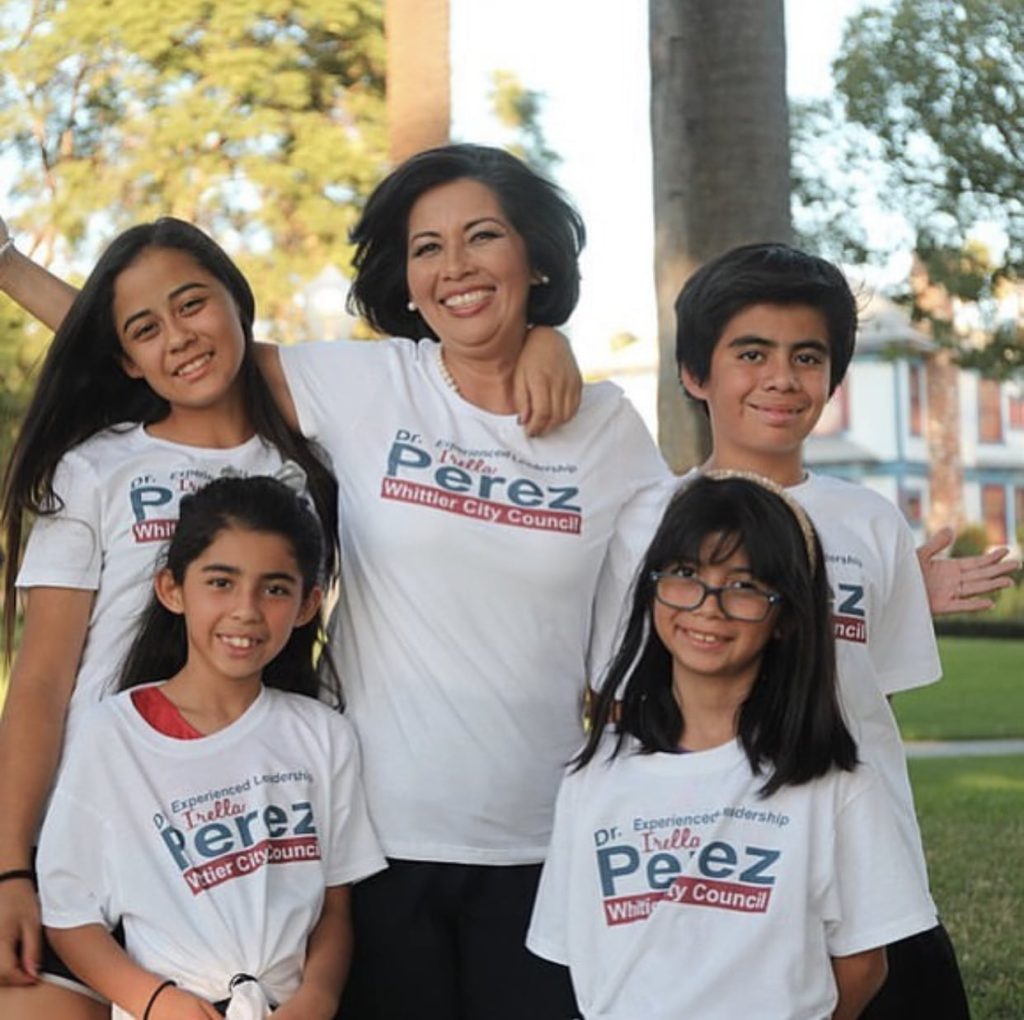
With her children during her campaign for a city council seat. Photo: Courtesy
The educator has received multiple awards in her community, including the one given by Senator Archuleta in March of this year, when he selected her as part of the “Women of Achievement” group.
Today Irella works for a foundation where she is in charge of seeking funds for research to ensure equitable access to clean air, especially for the most marginalized and polluted communities in California.
The Nicaraguan migrant’s long journey in the United States has been exhausting, but satisfying. “The hardest part is that racism is real, sexism is real and it is cruel, hurtful, but you have to go on… they don’t like you for being a woman, for being a Latina, a migrant, for having an ‘accent’. I am very proud of myself, of where I come from,” she says.
She says the best thing about being a migrant and having chosen her career is having broken barriers, opened doors and given access to other people. That satisfaction far outweighs the adversities she has overcome.
This article was originally published in Spanish in Confidencial and translated by Havana Times
PUBLICIDAD 3M
Periodista nicaragüense desde 2007, con experiencia en prensa escrita, televisión y medios digitales. Tiene una especialización en producción audiovisual y una maestría en Medios de Comunicación, Estudios de Paz y Conflicto de la Universidad para la Paz de las Naciones Unidas. Fundadora y editora de Nicas Migrantes, proyecto por el cual ganó el Impact Award 2022 del Departamento de Estado de EE. UU. Ha realizado coberturas in situ en Los Ángeles (Estados Unidos), México, El Salvador, Guatemala, Nicaragua y Costa Rica. También ha colaborado con France 24, The Guardian, Al Jazeera, BBC World Service. Ha sido finalista y ganadora de varios premios nacionales e internacionales, entre ellos el Premio Latinoamericano de Periodismo de Investigación Javier Valdez, del Instituto Prensa y Sociedad (IPYS), 2022.
PUBLICIDAD 3D